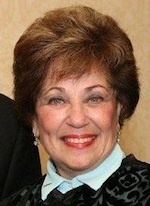
Marilyn Gilbert: “Eruvin” – Boundary or Isolationism?
I am sitting at home isolated and alone. It is August of the year of Covid-19 – the current pandemic affecting millions of people all over the world.
Isolation is many things to many people. The dictionary defines “isolation” in several ways: to wit: “separation, segregation, setting apart, keeping apart, quarantine.” Some of these words could strike anxiety – even panic– into some. Isolation is a sentence – something one usually does not choose for oneself. It is generally an imposition – it is imposed on someone by someone else. As we know now, it is meant to be a way of preventing illness –illness that could be passed from one person to another. But no matter how cautionary, how logical (in a time of a pandemic), how important it is to be isolated from one another, its effect is the opposite of what most people seek, which is the social contact which means so much to most people. The comforting thought that one is not alone in the world.
Of course, there are people who prefer being alone but they are the few, not the many. In fact one of the obvious difficulties in containing the contagion of a plague is due to those people who simply cannot endure isolation for very long.
I began thinking about the current pages of Talmud we are studying in Daf Yomi: the study of the Eruv – an area set aside in a public space (ie., not the space in the home which is a private space) which allows observant Jews to carry things they would not otherwise be permitted to take from their home into any space outside of the privacy of their home. This all has to do with the law requiring Jews to rest on the Sabbath. It is that holy day with which the Eruv is associated. Without going into the whole discussion of the why’s and wherefore’s of the Sabbath laws (I suggest you take up Daf Yomi if you haven’t already), I would rather give some thought to what it means to make an area separate from the rest of public space. In other words, by hanging strings, or beams, or any other type of item which is used to define a particular space, Jews are permitted to carry essential things like keys, eyeglasses, canes, wheelchairs or even babies as they walk to the synagogue.
Depending on the size of the Eruv, which can be as small as an alley or as large as a small village, one might find not only the homes of Jews, but those of non Jews as well.
I could not help but wonder if defining a space might make one think of being isolated. One can argue that it is the opposite of isolation, especially since it really only applies to the Sabbath. But does not the very act of defining a space beyond which one could not take one’s wheelchair for example without violating the law – an isolation of sorts? What about the effect on non Jews who live with this defined space? Of course, they are not bound by the laws prohibiting the carrying of items from their home out into the public space. But is there an effect which could ‘separate’ these folks from one another psychologically? Does it create an “isolation” from one another?
I can hear the arguments already, but my point is merely to give a thought to whether setting up such boundaries also create boundaries between people? Is there not another way the sages could come up with to assure that the Sabbath is observed without creating a boundary between people? Are we in danger of isolating ourselves, as Jews, from the world around us and its other inhabitants? Is this really what G-d intended?
I pose the question.
~~~~~
Marilyn Gilbert was a civil rights trial attorney for over 25 years. As a classical singer performing since the age of five, she was also the co-founder, together with her husband Nathan Rundlett, of Opera Santa Barbara formerly known as the Santa Barbara Grand Opera. During the years she was a UCLA undergrad student and following her own internship in the US House of Representative in summer of 1974, she was the founder of the UCLA International Internship program upon her return to campus. After her graduation from UCLA, she studied law the the Loyola Law School in Los Angeles.